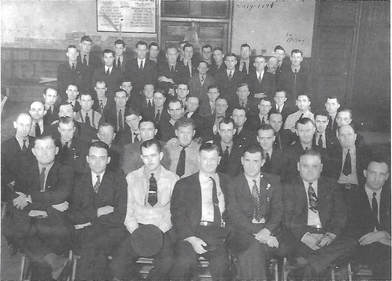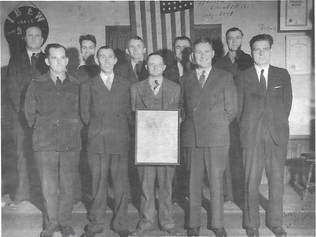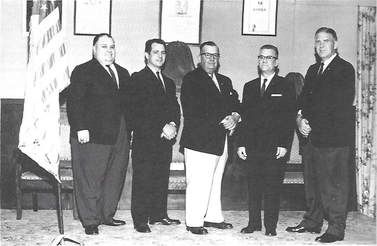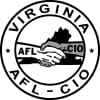 Photo was reproduced from a 1941 snapshot of Division 1177. Those in the picture represent only a portion of the members, others having been on duty at this time.
Photo was reproduced from a 1941 snapshot of Division 1177. Those in the picture represent only a portion of the members, others having been on duty at this time.
History of Local 1177
By W. C. BARRYThe Amalgamated Association of Street, Electric Railway and Motor Coach Employees of America, an affiliate of the American Federation of Labor, was set up as an organization catering only to all departments for the benefit of transportation workers exclusively. The organization was set up by the late W. D. Mahone in 1895 with Mr. W. D. Mahone as President. He remained in this capacity until his voluntary retirement in 1946. Brother Mahone died on October 31, 1949.
This organization is composed of approximately 1,400 locals in the United States, the Dominion of Canada and the Hawaiian Islands. In order that our readers may have some idea of the efforts put forth by the employees of transportation in the three Virginia cities, namely Norfolk, Portsmouth and Richmond to be represented by this great organization in regards to collective bargaining in respects to rates of pay, wages, hours of employment and other conditions of employment we will undertake to give you here the struggle the employees had in setting up the bargaining agency for the above mentioned purpose.
By W. C. BARRYThe Amalgamated Association of Street, Electric Railway and Motor Coach Employees of America, an affiliate of the American Federation of Labor, was set up as an organization catering only to all departments for the benefit of transportation workers exclusively. The organization was set up by the late W. D. Mahone in 1895 with Mr. W. D. Mahone as President. He remained in this capacity until his voluntary retirement in 1946. Brother Mahone died on October 31, 1949.
This organization is composed of approximately 1,400 locals in the United States, the Dominion of Canada and the Hawaiian Islands. In order that our readers may have some idea of the efforts put forth by the employees of transportation in the three Virginia cities, namely Norfolk, Portsmouth and Richmond to be represented by this great organization in regards to collective bargaining in respects to rates of pay, wages, hours of employment and other conditions of employment we will undertake to give you here the struggle the employees had in setting up the bargaining agency for the above mentioned purpose.
 This photo was reproduced from a snapshot taken in 1941. Meeting of the officers of Local Div. 1177 and International Representative after receiving their charter.
This photo was reproduced from a snapshot taken in 1941. Meeting of the officers of Local Div. 1177 and International Representative after receiving their charter.
About 1933 when the Wagner Labor Act was enacted by the Senate and Congress of the United States and signed by the late President Roosevelt and validated by the Supreme Court in 1937. Immediately thereafter an independent Union known as the I. O. O. E. was established on this property and in our minds was not sufficient to give the employees the benefits that we thought we were justly entitled to. Immediately thereafter the Transport Workers Union (C. I. O.) started organizing the employees in Norfolk. They succeeded in getting about 100 employees interested which was not a majority, and soon afterwards the C.I.O. discontinued their efforts. In the late part of 1937 an appeal was made to the Amalgamated Association of Street Electric Railway and Motor Coach Operators of America for assistance from the International Office in organizing the employees on the Virginia Electric and Power Company property. The home office in Detroit sent to Norfolk Mr. Floyd W. Kreisel, 13th International Vice-President at that time, who immediately started organizing the employees under the banner of the Amalgamated. On July 20, 1937, the Transport Workers Union (C.I.O.) filed with the Regional Director of the Fifth Region (Baltimore) charging the V.E.P. with unfair labor practice. After investigation, the National Labor Relations Board called a hearing which was held in Norfolk, Va., from May 19 through June 18, 1938, in which certain employees of the V.E.P. testified.
On May 21, 1938, the Amalgamated which was in progress of organizing the employees of the V.E.P. Company filed amended charges of unfair labor practices by the V.E.P. In the meantime several employees were discharged which the Amalgamated considered was for labor or union activity. These charges the company denied and it was brought out at hearing of N.L.R.B. that these members were discharged for union activity. The N.L.R.B. handed down a decision against the V.E.P. Company on February 27, 1940. This order instructed the company to abolish the I.O.O.E. and to discontinue their unfair labor practice and to give the employees the right to organize in any organization of their own choosing. Immediately thereafter the company appealed the decision to the Fourth Circuit Court of Appeals (U.S.). The court upheld the company handing down a decision reversing the N.L.R. B. The board then appealed the case to the United States Supreme Court. This court reversed the decision of the Fourth Circuit and remanded the case back to the N.L.R.B. for reconsideration. In July, 1942, the N.L.R-B handed down an entirely new decision in principle identical to the first decision but changing that part objected by the Supreme Court. The company again appealed to the Fourth Circuit Court of Appeals. In tie meantime the progress of the Amalgamated under the leadership of H. L. Johnson as president, E. L. King as recording secretary at that time, with the able assistance of our two International representatives, Floyd W. Kriesel and W. E. Whitt, and a stubborn and determined membership, had grown by leaps and bounds and a large majority of the employees were members and their patience had become exhausted.
As a result of this unnecessary delay the members of the three respective locals in Norfolk, Portsmouth and Richmond took a strike vote which was voted favorably and placed in the hands of a committee in each city to be put into effect at the discretion of the committee. The committee in co-ordination and cooperation put the strike in effect at 4:30 a.m. on October 21, 1942, which remained in effect until 3:00 p.m. the same day at which time the War Labor Board took jurisdiction in the matter and requested that the employees return to work immediately. With the understanding that the matter would be expedited the employees returned to their jobs. Shortly thereafter the W.L.B. appointed a panel to hear the case. The hearing was held in Richmond, Va., in November, 1942, with Mr. Tilford Dudley as chairman, who later made his report and recommendation. On the basis of the recommendation the W.L.B. directed the company to recognize the Amalgamated for the adjustment of grievances until such time as the N.L.R.B. certified a labor organization as the exclusive representative of the company's employees. Later the N.L.R.B. held an election and the Amalgamated was the choice of a substantial majority of the employees. Shortly thereafter the Circuit Court in its second decision upheld the N.L.R.B. and recommended that the Company Union be dis-established and the Amalgamated be adjudged the official bargaining agency, and that all dues deducted from the employees of the Independent Union be refunded which in effect amounted to around S97,000. The company agreed to dis-establish the I.O.O.E. and bargain with the employees through the Amalgamated but refused to abide by the court's decision in regards to refunding the back dues. This part of the Circuit Court order was again appealed to the Supreme Court of the U. S. The Supreme Court ruled at a later date, upholding the Fourth Circuit Court's decision, directing the company to abide by the court's decision and to refund the back dues. The company then complied.
On May 21, 1938, the Amalgamated which was in progress of organizing the employees of the V.E.P. Company filed amended charges of unfair labor practices by the V.E.P. In the meantime several employees were discharged which the Amalgamated considered was for labor or union activity. These charges the company denied and it was brought out at hearing of N.L.R.B. that these members were discharged for union activity. The N.L.R.B. handed down a decision against the V.E.P. Company on February 27, 1940. This order instructed the company to abolish the I.O.O.E. and to discontinue their unfair labor practice and to give the employees the right to organize in any organization of their own choosing. Immediately thereafter the company appealed the decision to the Fourth Circuit Court of Appeals (U.S.). The court upheld the company handing down a decision reversing the N.L.R. B. The board then appealed the case to the United States Supreme Court. This court reversed the decision of the Fourth Circuit and remanded the case back to the N.L.R.B. for reconsideration. In July, 1942, the N.L.R-B handed down an entirely new decision in principle identical to the first decision but changing that part objected by the Supreme Court. The company again appealed to the Fourth Circuit Court of Appeals. In tie meantime the progress of the Amalgamated under the leadership of H. L. Johnson as president, E. L. King as recording secretary at that time, with the able assistance of our two International representatives, Floyd W. Kriesel and W. E. Whitt, and a stubborn and determined membership, had grown by leaps and bounds and a large majority of the employees were members and their patience had become exhausted.
As a result of this unnecessary delay the members of the three respective locals in Norfolk, Portsmouth and Richmond took a strike vote which was voted favorably and placed in the hands of a committee in each city to be put into effect at the discretion of the committee. The committee in co-ordination and cooperation put the strike in effect at 4:30 a.m. on October 21, 1942, which remained in effect until 3:00 p.m. the same day at which time the War Labor Board took jurisdiction in the matter and requested that the employees return to work immediately. With the understanding that the matter would be expedited the employees returned to their jobs. Shortly thereafter the W.L.B. appointed a panel to hear the case. The hearing was held in Richmond, Va., in November, 1942, with Mr. Tilford Dudley as chairman, who later made his report and recommendation. On the basis of the recommendation the W.L.B. directed the company to recognize the Amalgamated for the adjustment of grievances until such time as the N.L.R.B. certified a labor organization as the exclusive representative of the company's employees. Later the N.L.R.B. held an election and the Amalgamated was the choice of a substantial majority of the employees. Shortly thereafter the Circuit Court in its second decision upheld the N.L.R.B. and recommended that the Company Union be dis-established and the Amalgamated be adjudged the official bargaining agency, and that all dues deducted from the employees of the Independent Union be refunded which in effect amounted to around S97,000. The company agreed to dis-establish the I.O.O.E. and bargain with the employees through the Amalgamated but refused to abide by the court's decision in regards to refunding the back dues. This part of the Circuit Court order was again appealed to the Supreme Court of the U. S. The Supreme Court ruled at a later date, upholding the Fourth Circuit Court's decision, directing the company to abide by the court's decision and to refund the back dues. The company then complied.
 EXECUTIVE BOARD—LOCAL DIV. 1177: Left to right—E. C. Cullipher, O. J. Pennell, A. L. Redfearn, Leon Franklin (Pension Plan Representative) and W. C. Barry.
EXECUTIVE BOARD—LOCAL DIV. 1177: Left to right—E. C. Cullipher, O. J. Pennell, A. L. Redfearn, Leon Franklin (Pension Plan Representative) and W. C. Barry.
In January, 1943, representatives from the three locals started negotiations on the proposed contract between the V.E.P. Co. and the Amalgamated. These negotiations lasted for approximately three weeks. Not being able to agree on all issues the union requested assistance from the United States Conciliation Service. Even then the company and the union were far apart on the issues in dispute. The issues were submitted to the N.L.R.B. for settlement. Later a panel was set up with Dr. George T. Starnes as chairman and the case was heard in Washington, D. C., in March, 1943. The panel in turn recommended maintenance of membership with deduction of dues with machinery set up for arbitration of matters of dispute, with one week's vacation for all employees of bargaining unit, five holidays to be observed with pay in the shops, inspection garages, and maintenance and roadway department with time and a half to be paid if worked on these holidays. Operating employees (car and bus operators) received an increase of eight cents per hour. And the mechanical and track department were given a graduating increase from four cents per hour to 14 cents per hour. Assistant cashiers were given an increase of approximately $10.00 per month. The decision of the panel was upheld by the Third Regional War Labor Board in Philadelphia and the first contract between the Amalgamated and the V.E.P. Co. was signed and put into effect June 7, 1943, to run for a period of one year. In April 1944, the company was given notice of their desire to negotiate amendments to the then existing contract. Negotiations were started on May 29, 1944, and continued at short intervals until July, 1944. There were many issues unsettled. Again assistance was requested from the U. S. Conciliation Service without success, and the issues in dispute were submitted to the Fourth Regional Board in Atlanta, Ga., who then had jurisdiction in this area. A panel was set up with Dr. Stove Nettles as chairman, and a hearing was held in Richmond, Va., beginning on October 9, continuing through the 12th, resuming on November 27th, continuing through the 29th. While awaiting a decision in the matter which was long delayed, the V.E.P. Co. disposed by sale of their transportation properties in Norfolk and Richmond which was purchased by bid by the Equitable Securities and the A. C. Allen & Co. The new company took over the properties on December 29, 1944. As our case was still pending before the board the union and the new company entered into a stipulation in which the new company agreed to recognize the union and also to become a party of the dispute still pending before the Fourth Regional Board.
In March, 1945, the panel handed down its report and recommendation which both companies refused to abide by, and a hearing was requested by the companies to the Fourth Regional Board which was granted by said board. This hearing was heard in Atlanta in May, 1945, and the panel's recommendation was revised to such an extent that the union appealed to the National War Labor Board in Washington, D. This hearing was heard by all parties concerned October, 1945, and the War Labor Board amended the Regional Board directive order granting the mem a five-cent-an-hour increase to all employees of company with one week's vacation for employees with one year's service, to two weeks after five years' service along with other improvements in working conditions. The board also ruled that all issues shall be retroactive to June 7, 1944. The company agreed to make the increase in pay retroactive but refused to consider retroactivity for fringe items. The members again took a strike vote and the Virginia Transit Company agreed to abide by the board's directive in making an issues retroactive. The V.E.P. Co. again appealed to the Fourth Regional Board for reclarification on the fringe items. The board upheld the union's interpretation of the directive orders and directed that all issues be retroactive. Both companies then complied.
The back pay checks were issued on December 16, 1945. In the meantime on November 13, 1945, negotiations were started for a new 1946 contract with all three locals represented with the able assistance of International Representative W. E. Whitt. After two weeks negotiations the company and union agreed on all issues and in turn the committee reported to the respective membership for their approval or rejection. The contract as negotiated was accepted by the membership of the three respective divisions which was in turn duly signed and put into effect on January 1, 1946. Some of the improvements are worthy of mention here, such as union security with check-off of dues, grievance clause improved, free transportation for employees in their own respective city, and when visiting other cities passes to be issued on request, improvements in medical examination, employees injured in line of duty to be paid full time for a period of 90 days. Both parties agreed to work out a permanent pension plan for the employees with two weeks vacation for all employees with one year's service with company. All regular runs to be set up to average from eight to ten and one-half hour with time and a half thereafter. All employees will have one day off per week, time and a half if worked on off day, 25 minutes show-up and checking in time, travel time from point of relief to point of turn in, all extra men shall have, if they desire, eight hours' rest out of each twenty-four, all operators' chauffeurs' badges paid for by company, all employees paid for attending safety meetings. Union representatives paid while signing up new car and bus board, all senior operators instructing students be paid 12 cents in addition to their regular rate of pay. All operators granted an increase of seven cents an hour. Assistant cashiers were granted an increase of approximately $15.00 per month. All employees in the garage, shop and track department be granted a seven cents an hour increase. All wage increases retroactive to June 7, 1943. did not represent the linesmen in any previous contract.) Special recognition is given here for the officers who have carried the burden of continually fighting to uphold the principles of organized labor.
In March, 1945, the panel handed down its report and recommendation which both companies refused to abide by, and a hearing was requested by the companies to the Fourth Regional Board which was granted by said board. This hearing was heard in Atlanta in May, 1945, and the panel's recommendation was revised to such an extent that the union appealed to the National War Labor Board in Washington, D. This hearing was heard by all parties concerned October, 1945, and the War Labor Board amended the Regional Board directive order granting the mem a five-cent-an-hour increase to all employees of company with one week's vacation for employees with one year's service, to two weeks after five years' service along with other improvements in working conditions. The board also ruled that all issues shall be retroactive to June 7, 1944. The company agreed to make the increase in pay retroactive but refused to consider retroactivity for fringe items. The members again took a strike vote and the Virginia Transit Company agreed to abide by the board's directive in making an issues retroactive. The V.E.P. Co. again appealed to the Fourth Regional Board for reclarification on the fringe items. The board upheld the union's interpretation of the directive orders and directed that all issues be retroactive. Both companies then complied.
The back pay checks were issued on December 16, 1945. In the meantime on November 13, 1945, negotiations were started for a new 1946 contract with all three locals represented with the able assistance of International Representative W. E. Whitt. After two weeks negotiations the company and union agreed on all issues and in turn the committee reported to the respective membership for their approval or rejection. The contract as negotiated was accepted by the membership of the three respective divisions which was in turn duly signed and put into effect on January 1, 1946. Some of the improvements are worthy of mention here, such as union security with check-off of dues, grievance clause improved, free transportation for employees in their own respective city, and when visiting other cities passes to be issued on request, improvements in medical examination, employees injured in line of duty to be paid full time for a period of 90 days. Both parties agreed to work out a permanent pension plan for the employees with two weeks vacation for all employees with one year's service with company. All regular runs to be set up to average from eight to ten and one-half hour with time and a half thereafter. All employees will have one day off per week, time and a half if worked on off day, 25 minutes show-up and checking in time, travel time from point of relief to point of turn in, all extra men shall have, if they desire, eight hours' rest out of each twenty-four, all operators' chauffeurs' badges paid for by company, all employees paid for attending safety meetings. Union representatives paid while signing up new car and bus board, all senior operators instructing students be paid 12 cents in addition to their regular rate of pay. All operators granted an increase of seven cents an hour. Assistant cashiers were granted an increase of approximately $15.00 per month. All employees in the garage, shop and track department be granted a seven cents an hour increase. All wage increases retroactive to June 7, 1943. did not represent the linesmen in any previous contract.) Special recognition is given here for the officers who have carried the burden of continually fighting to uphold the principles of organized labor.


